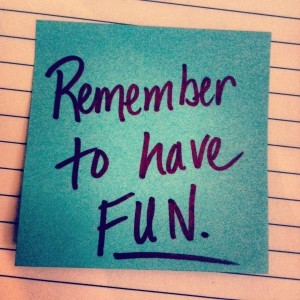 Let’s play a game. Imagine that you’re in a classroom. In front of you, there’s a professor, wagging his or her finger while preaching to you. (The professor is in the Knower/Judger persona, naturally…it’s the job.) The professor goes on and on while you sit there. How likely is it that you are going to retain the new information? Now imagine that you’re being given the same information but there is a game or competition involved. Will it be easier to learn? You bet! Here’s why.
Let’s play a game. Imagine that you’re in a classroom. In front of you, there’s a professor, wagging his or her finger while preaching to you. (The professor is in the Knower/Judger persona, naturally…it’s the job.) The professor goes on and on while you sit there. How likely is it that you are going to retain the new information? Now imagine that you’re being given the same information but there is a game or competition involved. Will it be easier to learn? You bet! Here’s why.
Back in 2009, Volkswagen initiated a contest based on its “Fun Theory,” which was
dedicated to the thought that something as simple as fun is the easiest way to change people’s behavior for the better. Be it for yourself, for the environment, or for something entirely different, the only thing that matters is that it’s change for the better.
It’s been my experience that I don’t learn well when I’m in my K/J mode. If I “know,” then my tendency is to constantly and defensively compare what I know with the information the other person is trying to deliver. I’m sorry, but my knowledge trumps the new info as long as I’m in my K/J mode. The same thing happens with your student, direct report, or team member. Lecture anyone, and you get resistance.
Get me in my Learner/Researcher mode, however, and it’s a whole new story. There is a childlike component to the L/R, and fun can be the catalyst for getting me into that mode. If I perceive what’s happening as fun, then my automatic response probably doesn’t take me into the “fight or flight” K/J zone. I’m now not closed off to your new data. Can you recognize this in yourself?
So along comes VW (well, its marketing people, anyway) with the Fun Theory.
Think about how VW’s initiative could apply to your world. Do you have a team with some errant work habits? Kids who rebel? Partners who continually butt heads on every issue?
Can you find a way to alter behaviors by getting creative with some fun?
Are your training programs either canned video presentations of talking heads or live talking heads? How about finding ways to make training fun? The best facilitators use games and contests to engage participants’ L/Rs so that they are open to new information instead of judging the message and finding it inferior to what they already know.
Several years ago, I had the distinct pleasure of sharing a lunch with Dr. Sivasailam “Thiagi” Thiagarajan. Thiagi is a brilliant behaviorist who works his magic with games. He has games for everything. His lesson for me, however, was that the amount of learning that sticks increases exponentially as the fun experienced during the lesson increases. If you want to learn more, he’s got great information here.
Is it more fun to listen, talk, or dialogue?
Is it more fun to sit or get up and move around?
Is it more fun to be indoors or out?
Is it more fun to do or see done?
Is it more fun to watch a lesson solo or engage in it with a group?
We have control over these things.
We have a tendency to do what’s always been done and deliver the learning material in the easiest manner, and it doesn’t really work very well. Paper. Video. Workbook. Programmed learning. Fill in the blanks.
Is it more fun to replicate the past or get creative?
Have some fun. Those you want to teach will learn more, and so will you!

